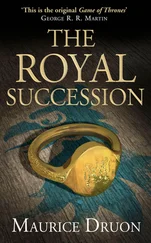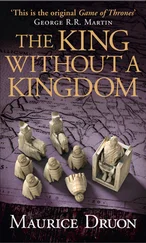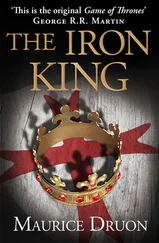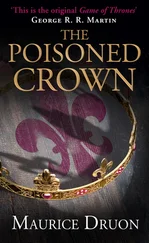He tried to persuade her that she had misunderstood him, that he wanted nothing but her good, that their conversation had taken an unexpected turn, that he had suddenly remembered the poor priest freezing at the bottom of the staircase.
She looked at him with scorn and irony. He picked her up, though she did her best to defend herself, and carried her roughly to the bed.
‘No, I shall not sign,’ she cried, fighting against him. ‘You can rape me if you like, because you are too strong for me to be able to resist you, but I shall tell the Chaplain, I shall tell Bersumée, I shall let Marigny know what sort of ambassador you are and how you have taken advantage of me.’
Furiously angry, he let her go, restraining himself from slapping her face as he felt inclined to do.
‘Never, do you see,’ she went on, ‘will you get me to admit that my daughter is not Louis’s, for should Louis die, which I hope he does with all my heart, my daughter would become Queen of France and then people would have to take some account of me as Queen Mother.’
For a moment Artois remained silent in astonishment. ‘What she says makes sense, the clever bitch,’ he said to himself, ‘and if by chance fate should prove her right …’ He was checkmated.
‘It’s an unlikely chance,’ he replied all the same.
‘I have no other, so I shall hang on to it.’
‘As you will, Cousin,’ he said, going to the door.
His double failure made him extremely angry. He went down the stairs, found the Chaplain waiting for him, chilled to the bone, a bunch of goose-quills in his hand.
‘Monseigneur,’ said the Priest, ‘you won’t forget to say to Brother Renaud …’
‘Yes,’ shouted Artois, ‘I’ll tell him that you’re an ass, my fine fellow; I don’t know where the hell you manage to find weaknesses in your penitents!’
Then he called, ‘Escort! To horse!’
Bersumée arrived, still wearing the helmet which had not left his head since morning.
‘What are my orders, Monseigneur?’ he asked.
‘What, your orders? Obey those you already have.’
‘And my furniture?’
‘I don’t care a damn about your furniture.’
Artois’s great Norman horse was already being led out to him, and Lormet held the stirrup ready.
‘And who will pay for the food, Monseigneur?’ asked Bersumée.
‘You will get it from Messire de Marigny! Go and lower the drawbridge!’
Artois hoisted himself athletically into the saddle and set off at a mad gallop, followed by his whole escort.
Soon in the falling darkness nothing was to be seen upon the slopes of Château-Gaillard but the sparks struck by the horses’ shoes.

THE FLAMES OF THOUSANDS of tapers, arranged in clusters against the pillars, threw their wavering light upon the effigies of the Kings of France; ever and again the long stone faces seemed to assume the mobile expressiveness of a dream world, and one might have thought that an army of knights was sleeping an enchanted sleep in the middle of a flaming forest.
In the basilica of Saint-Denis, the royal necropolis, the Court was attending the burial of Philip the Fair.
Drawn side by side in the central nave, facing the new tomb, the whole Capet tribe were present in sombre and sumptuous mourning: the princes of the blood, the lay peers, the ecclesiastical peers, the members of the Inner Council, the Grand Almoners, the High Constable, indeed all the principal dignitaries of the Crown.
The Lord Chamberlain, followed by five officers of the household, 4advanced with solemn tread to the edge of the open vault into which the body had already been lowered, threw into the cavity the carved wand which was the insignia of his office, and pronounced the formula which officially marked the change of reign: ‘The King is dead! Long live the King!’
After him, all present repeated: ‘The King is dead! Long live the King!’
And the cry from a hundred throats resounded from bay and arch and pillar and re-echoed among the high vaults.
The Prince with the lack-lustre eyes, narrow shoulders and hollow chest who, at this moment, had become Louis X, felt a curious sensation in the nape of his neck, as if stars were bursting there. His whole body was seized by an agonizing chill and he was afraid of falling down in a swoon. He began to pray for himself as he had never prayed for anyone in the world.
On his right hand his two brothers, Philippe, Count of Poitiers, and Prince Charles, who had not as yet acquired a territorial estate, gazed fixedly at the tomb, their hearts constricted by the emotion every man must feel, be he child of poverty or king’s son, at the moment his father’s body is lowered into the earth.
On the left of the new Sovereign were his two uncles, Monseigneur Charles of Valois and Monseigneur Louis of Evreux, both big men who had already passed their fortieth year.
The Count of Evreux was a prey to memories of the past. ‘Twenty-nine years ago,’ he thought, ‘we too were three sons standing upon these same stones before our father’s tomb. It seems such a little while ago; and now Philip has gone. Life is already over.’
His eyes turned to the nearest effigy, which was that of King Philip III. ‘Father,’ prayed Louis of Evreux with all his heart, ‘receive my brother Philip kindly into the other kingdom, for he succeeded you well.’
Further along, near the altar, was the tomb of Saint Louis, and beyond again the stone effigies of the great ancestors. And then, on the other side of the nave, the empty spaces, bare flagstones which one day would open for this young man who was succeeding to the throne, and after him, reign upon reign, for all the kings of the future. ‘There is still room for many centuries of them,’ thought Louis of Evreux.
Monseigneur of Valois, his arms crossed, his chin held high, his eyes restless, observed all that was going on, watching to see that the ceremony was properly conducted.
‘The King is dead! Long live the King!’
Five times more the cry sounded through the basilica as the chamberlains passed by. Then the last wand rebounded from the coffin and silence fell.
At that moment Louis X was seized with a violent fit of coughing that he was quite unable to control. A flux of blood mounted to his cheeks and for a long moment he was shaken by a paroxysm, as if he were about to spit his soul out before his father’s grave.
All those present looked at each other, mitre bent towards mitre, crown towards crown; there were whispers of anxiety and pity. Everyone was thinking, ‘Supposing he too were to die within a few weeks, what would happen then?’
Among the peers of France the redoubtable Countess Mahaut of Artois, her face red from the cold, watched her giant nephew Robert, and wondered why he had arrived at Notre-Dame the day before only in the middle of the funeral mass, unshaven and muddied to the waist. Where had he come from, what had he been doing? As soon as Robert appeared, there was intrigue in the air. The favour in which he seemed to stand, since Philip the Fair had died a few days ago, did nothing to reassure the Countess. And she was thinking that if the new King should catch a bad chill while burying his father, her affairs would come to fruition all the quicker.
Surrounded by the justiciars of the Council, Monseigneur Enguerrand de Marigny, Coadjutor of the Sovereign they were burying, and Rector-General of the kingdom, wore a princely mourning. From time to time he exchanged glances with his younger brother, Jean de Marigny, Archbishop of Sens, 5who had officiated the day before at Notre-Dame and now, mitre on head, crozier in hand, was surrounded by the high clergy of the capital.
Читать дальше




![Джеймс Чейз - Not Safe to Be Free [= The Case of the Strangled Starlet]](/books/417649/dzhejms-chejz-not-safe-to-be-free-the-case-of-the-thumb.webp)








